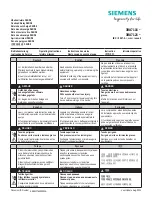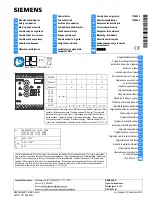
13-2
Testing And Maintenance
BE1-CDS220
faithfully, that relay logic is appropriate, and, that protective elements and equipment (main or auxiliary)
operate correctly are goals that can be achieved during this type of testing.
Basler Electric recommends that all captured fault records and sequence of event records be analyzed
and kept on file as in-service periodic test results for this particular device. This is an indication that all
protective elements and associated equipment are operating satisfactorily.
It is not the intent of this manual to elaborate on every conceivable test possible since this would encroach
on individual preferences, techniques, and philosophies. It is the intent to pursue relevant testing methods
to verify this relay meets published design specifications and applicability.
Functional Testing
Functional (or application) testing is significantly more comprehensive in nature and is intended to test
suitability for a particular application. Functional testing also provides a means to familiarize yourself with
the logic and operation of this device. Test setups are generally more involved and often times include
ancillary equipment beyond voltage or current source type equipment. While economics may at times
prohibit full functional testing, it is recommended that some application testing be performed when
published specifications lack appropriate detail to satisfy application testing requirements.
Basler Electric performs a thorough and comprehensive functional test of all relays before shipping. This
ensures that this device is within specified tolerances, measures accurately, and operates correctly as
designed.
Performance Testing
Performance testing can be accomplished through the capture and playback of system fault records. In
actual applications, this type of test realizes further confirmation of faithful relay responses during system
disturbances. For specific power system disturbances, relays can be subjected to a recreation of captured
events with the aide of equipment capable of replicating COMTRADE record files. In these instances,
there is significant merit in testing relays in this manner to assess relay performance. Correct response of
relay action in a performance test is supplemental verification of the conclusions drawn from functional (or
application) tests.
This type of testing verifies not only whether or not the device operated correctly for a particular system
disturbance, but also offers additional confirmation of your protection philosophy in this application. It is
beyond the scope of this manual to develop performance tests for this device. For assistance in
developing these types of tests, please consult Basler Electric and your test equipment manufacturer.
TESTING AND TROUBLESHOOTING AIDS
Under test or in-service, the BE1-CDS220 provides several ways to check operations, targets, or events.
A continuous self-test monitors the system health and status. The most basic reporting function is targets.
Targets may be viewed through ASCII command interface or through the optional front panel HMI. Fault
Summary Reports, Sequence of Events Recorder (SER) Reports, and Oscillographic Records yield more
detail.
Each time a system disturbance occurs in or around this relay’s zone of protection, it is a test of the relay
performance during the fault. If a questionable operation (or lack of) results in the need for
troubleshooting, you have several ways in which to troubleshoot the relay, the installation, and the overall
application.
Relay Self-Test
All internal circuitry and software that affect the relay core functionality are monitored by the continuous
self-test diagnostics. For specific relay trouble alarms, the self-test diagnostics force the microprocessor to
reset and try to correct the problem. If unsuccessful, OUTA operates, the Relay Trouble LED on the front
panel turns ON, all of the output relays are disabled, internal logic point ALMREL is set, and the relay is
taken off line. For more information on self-test diagnostics and relay trouble alarms, see Section 6,
Reporting and Alarm Functions, Alarms Function.
Summary of Contents for BE1-CDS220
Page 2: ......
Page 10: ...viii Introduction BE1 CDS220 This page intentionally left blank...
Page 36: ...ii Quick Start BE1 CDS220 This page intentionally left blank...
Page 48: ...ii Input And Output Functions BE1 CDS220 This page intentionally left blank...
Page 66: ...iv Protection and Control BE1 CDS220 This page intentionally left blank...
Page 112: ...ii Metering BE1 CDS220 This page intentionally left blank...
Page 116: ...5 4 Metering BE1 CDS220 This page intentionally left blank...
Page 166: ...ii BESTlogic Programmable Logic BE1 CDS220 This page intentionally left blank...
Page 176: ...7 10 BESTlogic Programmable Logic BE1 CDS220 This page intentionally left blank...
Page 234: ...8 56 Application BE1 CDS220 This page intentionally left blank...
Page 236: ...ii Security BE1 CDS220 This page intentionally left blank...
Page 240: ...9 4 Security BE1 CDS220 This page intentionally left blank...
Page 242: ...ii Human Machine Interface BE1 CDS220 This page intentionally left blank...
Page 256: ...10 14 Human Machine Interface BE1 CDS220 This page intentionally left blank...
Page 258: ...ii ASCII Command Interface BE1 CDS220 This page intentionally left blank...
Page 422: ...14 32 BESTCOMS Software BE1 CDS220 This page intentionally left blank...
Page 424: ...ii Time Current Characteristics BE1 CDS220 This page intentionally left blank...
Page 452: ...ii Terminal Communication BE1 CDS220 This page intentionally left blank...
Page 456: ...C 4 Terminal Communication BE1 CDS220 This page intentionally left blank...
Page 458: ...ii Settings Calculations BE1 CDS220 This page intentionally left blank...
Page 475: ......
















































